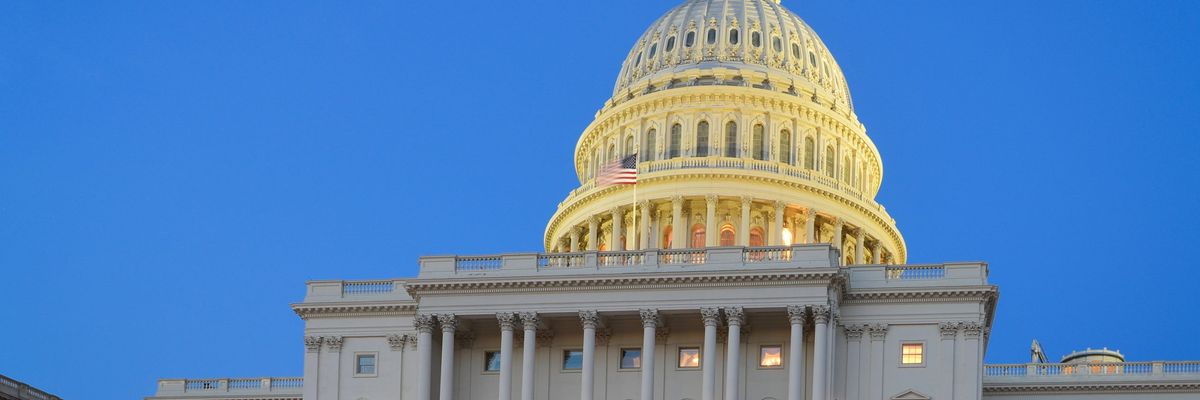Bipartisan majorities of citizens want Congress to exert greater control over Washington’s use of military force and sales of U.S. arms to foreign nations, according to a new public-opinion poll released Tuesday by the University of Maryland’s Program for Public Consultation.
Bipartisan majorities support a proposal contained in several pending bills that would automatically cut off funding for any military operation unilaterally initiated by the president after 60 days unless Congress acts to approve it, according to the survey, which noted that the nearly 50-year-old War Powers Act currently requires a super-majority in each house of Congress to override a presidential veto.
Fifty-three percent of self-identified Republicans, 62 percent of self-identified Democrats, and 58 percent of Independents said they support the proposal.
The poll, which was conducted online from Jan 27 to Feb 28 with a nationally representative sample of 2,702 registered voters, also found that bipartisan majorities favor repealing the 2001 Authorization to Use Military Force, or AUMF, that was hurriedly passed after the 9/11 attacks and that authorized the president to use military force against individuals or organizations involved in the attacks and those who aided them. Fifty-nine percent of all respondents said they favored repeal, including 65 percent of Democrats, 52 percent of Republicans, and 63 percent of Independents.
Similar percentages of respondents (56 percent of Republicans, 68 percent of Democrats, and 61 percent of Independents) said they favor requiring Congress to actively approve arms sales to foreign nations of more than $14 million. (A 1976 law currently in effect established that threshold.) The proposal, which is based on pending legislation introduced in the Senate by Chris Murphy (D-Conn.) and in the House of Representatives by Jim McGovern (D-Mass.), would give Congress the power to stop arms sales with a simple majority that would not be subject, as they are now, to a veto by the president.
If enacted, their bills would likely put into much greater question the future of U.S. arms sales to Saudi Arabia and the United Arab Emirates whose war in Yemen has proved extremely controversial with lawmakers. Until now, Congress has never succeeded in halting arms sales approved by the executive branch.
The survey’s findings do not reflect major changes in attitudes towards the use of U.S. military force or arms sales in recent decades, according to Steven Kull, the director of Maryland’s Program, who has specialized in polling and assessing public opinion on foreign policy, including identifying common ground between the two major parties on the subject, for more than 25 years.
“We have been consistently finding bipartisan majority support for giving Congress greater say over the use of military force and arms sales,” he said. "It's not that the public is so enthusiastic about Congress; they see a lot of problems with the way Congress operates. But they do believe in the Founders’ ideas of checks and balances and they do believe that a decision as significant as using military force shouldn’t be left to the president alone. Ultimately, the public would like the people to be consulted on these decisions, and, while they don’t see Congress as being a mirror of the public, it’s still an institution that can offset the president if the president got too far out of line with the public," he told ResponsibleStatecraft.
The new poll is unusual in its methodology in that it attempts to take respondents through a “policymaking simulation” by giving them a briefing on policy options that are under consideration, presenting strongly stated arguments both for and against each option, and only then recording their answers. The entire text of the survey was reviewed by experts to ensure that the briefings were accurate and balanced and the arguments presented were the strongest to be made.
Respondents were also asked which arguments that were presented were most compelling.
The questionnaire and its results, broken down not only by party, but also by the respondent’s intensity of identification with the party, can be viewed here, while readers can review the policymaking simulation here.
Not only did majorities in both parties and independents favor enhancing Congressional powers vis-à-vis military operations and arms sales, but majorities in various demographic groups, including whites, blacks, and Hispanics; men and women; and all age groups, income categories and levels of education agreed. Among respondents who identified as “very red” and “very blue” there were no significant differences on either enhancing Congress’ war powers (59 percent to 62 percent, respectively) or on arms sales (70 to 70 percent). The most significant difference was on repealing the 2001 AUMF — 55 percent of Republicans who described themselves as “very red” supported repeal compared to 66 percent of “very blue” Democrats.
The survey’s margin of error is +/- 1.9%.















